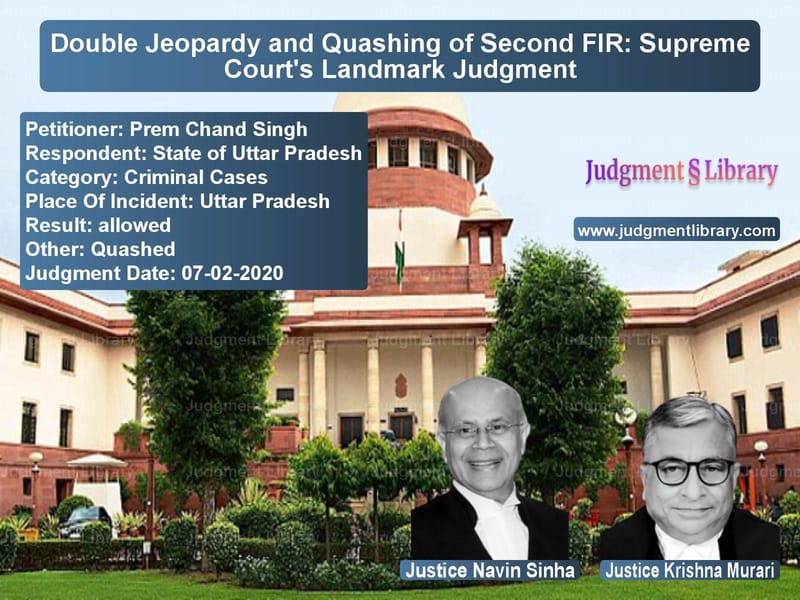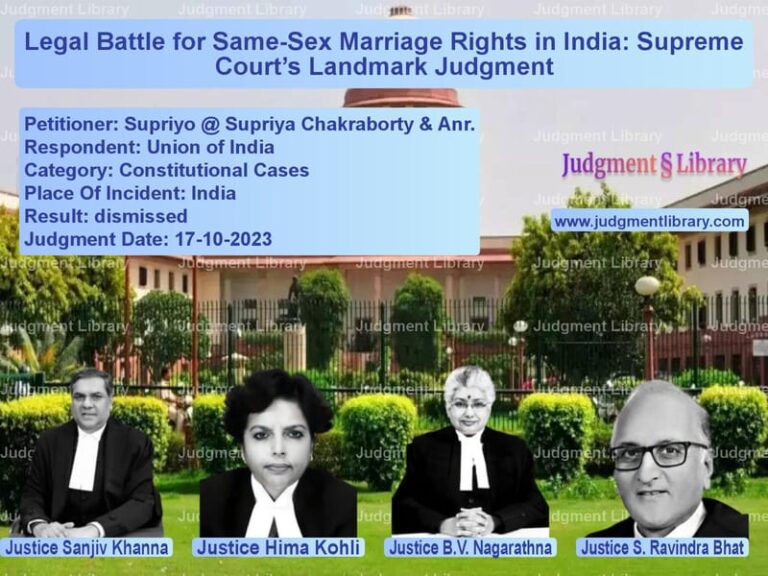Double Jeopardy and Quashing of Second FIR: Supreme Court’s Landmark Judgment
The case of Prem Chand Singh vs. State of Uttar Pradesh revolves around a crucial legal principle: the protection against double jeopardy under Section 300 of the Code of Criminal Procedure (CrPC). The Supreme Court examined whether a second FIR on the same facts, despite an earlier acquittal, could be sustained. The ruling provides clarity on the scope of multiple prosecutions for the same offense.
The appellant, Prem Chand Singh, challenged the second FIR, which was registered against him in 2008. The case stemmed from an alleged fraudulent general power of attorney executed in 1985, leading to land sales. The first FIR (1989) had already led to his acquittal in 1998. However, the complainant later initiated another FIR (2008) with additional charges.
Arguments by the Petitioner
The appellant raised the following key arguments:
- He had already been acquitted in 1998 for the same set of allegations regarding the forged general power of attorney.
- Filing a second FIR on the same matter amounted to double jeopardy, violating Section 300 CrPC.
- The complainant, despite knowing about the acquittal, concealed this fact and misled the police.
- The Civil Suit filed by the complainant in 2007 for the cancellation of the power of attorney was itself an acknowledgment that the document was genuine.
- The second FIR was an abuse of the process of law and should be quashed.
Arguments by the Respondent
The respondent, on the other hand, contended:
- The second FIR included new allegations, such as the use of an imposter in place of the complainant before the registration authorities.
- Unlike the first FIR, the second one included charges under Sections 467, 468, and 471 of the Indian Penal Code (IPC), which were not considered earlier.
- The trial court rightly refused to discharge the accused, and the High Court upheld this decision, considering the new elements in the second FIR.
Supreme Court’s Key Observations
The Supreme Court, after carefully analyzing both FIRs and the trial court proceedings, held:
- The core subject matter of both FIRs was the same: the alleged forgery of the general power of attorney.
- Even though additional charges were added in the second FIR, the essence of the allegations remained unchanged.
- The filing of a Civil Suit in 2007 by the complainant for cancellation of the general power of attorney indicated acknowledgment of its validity.
- The complainant deliberately concealed the fact that the accused had been acquitted earlier.
- Section 300 CrPC explicitly prohibits prosecution for the same offense after acquittal.
Key Judicial Statements
The Court categorically held:
“If the substratum of the two FIRs is common, the mere addition of Sections 467, 468, and 471 IPC in the subsequent FIR cannot be considered as distinct ingredients to justify fresh prosecution.”
The Court further emphasized:
“The institution of a second FIR based on the same allegations, despite the earlier acquittal, is nothing but a gross abuse of the process of law.”
Final Verdict
The Supreme Court quashed the second FIR, ruling that the prosecution was unsustainable. The Court also set aside all subsequent orders passed by the trial court and High Court, bringing an end to the prolonged litigation.
This judgment reaffirms the protection under double jeopardy and ensures that individuals cannot be tried repeatedly for the same offense.
Petitioner Name: Prem Chand Singh.Respondent Name: State of Uttar Pradesh.Judgment By: Justice Navin Sinha, Justice Krishna Murari.Place Of Incident: Uttar Pradesh.Judgment Date: 07-02-2020.
Don’t miss out on the full details! Download the complete judgment in PDF format below and gain valuable insights instantly!
Download Judgment: Prem Chand Singh vs State of Uttar Prade Supreme Court of India Judgment Dated 07-02-2020.pdf
Direct Downlaod Judgment: Direct downlaod this Judgment
See all petitions in Fraud and Forgery
See all petitions in Attempt to Murder Cases
See all petitions in Judgment by Navin Sinha
See all petitions in Judgment by Krishna Murari
See all petitions in allowed
See all petitions in Quashed
See all petitions in supreme court of India judgments February 2020
See all petitions in 2020 judgments
See all posts in Criminal Cases Category
See all allowed petitions in Criminal Cases Category
See all Dismissed petitions in Criminal Cases Category
See all partially allowed petitions in Criminal Cases Category







